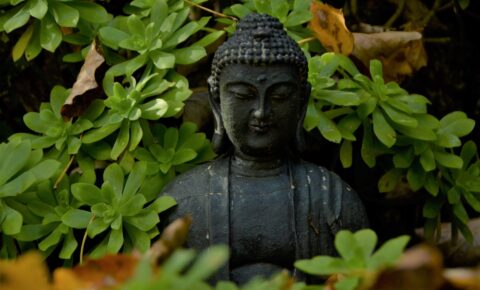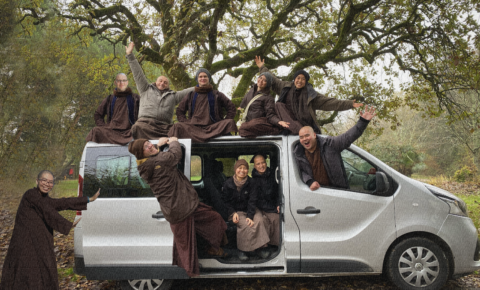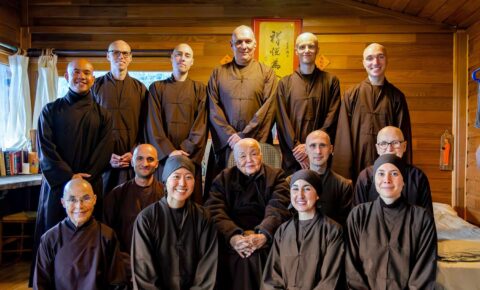Love and Trust Between Teacher and Disciple
When monastic and lay disciple do something wrong, clumsy, or unskillful, the Sangha should help them. I have learned over the past thirty years not to use my authority as a teacher to resolve conflicts. We have to use awakened understanding and love. This has to be applied both in the East and in the West. If we do not use this in Asia, we will not be successful as a teacher. Often, disciples cannot see the mind and heart of their teacher. We have to be patient. They think that their teacher’s heart is as small as a peanut. They think that I do not allow them to receive the precepts because I am punishing them, because I do not love them.
When a student looks at us like that we smile. We understand that our student does not know his teacher’s heart. After he is angry with me, six months later, he will see that I love him, and he will love me even more. But he needs time to grow up and to see more clearly. Everyone is like that; they need space, time, and the opportunity to grow up. They learn that my deepest desire is to see my disciples grow and to become big sisters and brothers for all our little sisters and brothers, to take my place. The more they do that, the happier I am.
The teacher is someone who has the capacity to allow his students to make mistakes. But we have to learn from our mistakes. If we fall down, we have to stand up and begin anew. We cannot make the same mistakes again. Our teacher has the capacity to help us to do this. This is something very precious. Our teacher is ready to trust us. But we have to help our teacher, so his trust in us can grow everyday. If my students do not help me, then no matter how I try, my trust will grow smaller. Teacher and disciple have to help each other. I am doing my best, so my students can continue to trust my wisdom, virtue, and love. And my disciples do the same. They do their best to help my trust in them grow stronger every day. The trust between teacher and disciple brings a lot of happiness. Trust is not an idea. Trust is something living that is expressed in our daily life. Our teacher has to live in such a way that we continue to trust him. And we have to live in such a ways that he continues to trust us. Then we both continue to be happy. If we doubt our teacher, if we doubt how our teacher treats us and feel that our teacher wants to limit our freedom, we cannot be happy.
When we are a teacher, we have the capacity to see all our disciples as our continuation. We help everyone grow. We don’t just want to support one or two of our disciples. We want everyone to grow, just as mothers and fathers want tall their children to grow up. If we are an older brother or sister in the Sangha, we have to look after every younger brother and sister equally. If we do that, we are already begun to be a teacher. If we know how to love all our disciples with equanimity, then, when we officially become teachers, there is no reason why we should not be successful.
Developing A Fourfold Sangha
Some difficulties in Plum Village happen because we come from different cultures. In Vietnam monks and nuns have different activities than laypeople. The monks and nuns are in the central circle, and the laypeople are in the outer circle of the community. In the time of the Buddha, monks and nuns lived with the Buddha in the monastery, and laypeople came to hear the Dharma talks and to give offerings. In the beginning, in Plum Village, there were only laypeople, so they were my principal disciples. When I ordained monks and nuns, the monastic became the primary focus attention.
When monks and nuns begin their practice, they are often very weak. But because they are determined and committed to practice, because they have invested their whole life into the community, they have a very high degree of practice. If they were not monastic, they could always leave, they would have money in the bank and a home to go back to. But as a monastic, they have given up everything, they shave their head and have nowhere to go. That is why they are 100 percent committed. They put all their time and energy into the practice; they do not think about their position, power, or things like that. So they progress quickly. After five years, they are ready to become a Dharmacarya (Dharma teacher). But laypeople cannot be trained twenty-four hours a day, 365 days a year. They cannot become Dharmacaryas in five years only. They need a longer time. But we don’t have enough monastic Dharmacaryas to go around and lay Dharmacaryas also have a high degree of understanding of laypeople’s situation and needs.
I want all our monasteries to have fourfold Sangha composed of monks, nun, laymen, and laywomen, and for the laypeople living there to be a bridge between the monastic community and the laypeople society. We can call these laypeople upasika (lay disciples who have received the Five Mindfulness Training) because they are close to the monks and nuns. As their understanding deepens, they will have the capacity to hand the insight and the happiness of the monastic Sangha to larger society. There are many laypeople who have helped develop the Order of Interbeing. The have received the Fourteen Mindfulness Training, a bridge that connects the monastic community to the lay community.
The Order of Interbeing began in 1966, with six people. Today there are more than seven hundred members all over the world. Now we want to establish lay communities led by laypeople, like Intesein in Germany (led by three lay Dharma teachers) and Clear View in Santa Barbara, California (led by two lay Dharma teachers). We hope there will be many lay centers led by members of the Order of Interbeing in the twenty-first century. We also hope there will be many Mindfulness Practice Centers to offer a secular practice of mindfulness without religious overtones. In these centers, people from any belief can comfortably practice without feeling they need to become Buddhists.






Join the conversation